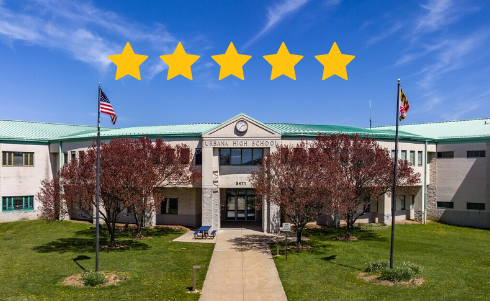As high school students approach graduation, many face the daunting question: What comes next?
College is often presented as the default choice for a successful future, but it really isn’t the only path. For those seeking a structured career, valuable skills and a chance to build a career without the burden of student loans, the U.S. military offers a strong alternative.
Why Choose the Military Over College?
Believe it or not, the military provides a wide range of career opportunities that go beyond combat roles. With branches like the Army, Navy, Air Force, Marines, Coast Guard and Space Force, the military offers hundreds of competitive career paths, from engineering and cybersecurity to healthcare and aviation. All of this is presented while also offering a more direct and financially stable route to career success compared to college.
Army recruiter in Frederick, Jose Coste, emphasizes this point saying, ”My decision was deeply personal. College seemed like the ‘expected’ route, but I felt drawn to something more immediate and purposeful. The military offered me a chance to serve, gain independence, and see the world while contributing to something bigger than myself. I also wasn’t entirely sure what I wanted to study in college, and the military provided a structured path where I could develop discipline and explore career options. For me, it was about wanting an adventure and a sense of belonging right away.”
Financial Benefits: Avoiding College Debt
One of the most significant advantages of joining the military is the financial relief it offers. College tuition has increased by a lot in recent years, with the average cost of a four-year degree at a public university exceeding $100,00. stead, the military provides a salary from day one, along with benefits such as housing allowances, healthcare, and access to the GI Bill, which can be used to pursue a career for free in the future.
In Coste’s words, “One of the most tangible benefits has been the education support through programs like the GI Bill. It allowed me to pursue higher education without the financial burden. The healthcare and housing assistance have been invaluable, especially as I started a family. These benefits extended to my loved ones, which gave me peace of mind. Having access to these resources has allowed me to focus on my goals without constantly worrying about finances or stability.”
According to data from the Department of Defense, enlisted members typically start with a base pay of around $25,000 annually, which increases with rank and experience. Service members also receive allowances that can significantly boost their total income. So for those concerned about the burden of student loans, this financial support can be a game-changer.
Career Training and Skill Development
While the military is mainly dedicated to building discipline and physical strength, it also offers extensive professional training in a variety of fields. Whether you are interested in intelligence, logistics, aviation, or medical services, the military provides top tier quality training that is often recognized by civilian employers and will definitely give you so many advantages in the real world. For instance, many roles within the military offer certifications and technical skills that can easily transfer to civilian careers.
According to Coste, “The military taught me leadership and adaptability in ways I never could have imagined. I learned to make decisions under pressure, communicate clearly, and work in diverse teams. Beyond soft skills, I gained technical expertise that’s directly transferable to civilian careers—whether in logistics, technology, or management. Military experience is respected by employers, and it will open doors I didn’t know existed. For example, I know I will be able to transition into a high-responsibility role in my civilian career thanks to the leadership foundation the military provided.”
In addition, the military’s commitment to education doesn’t just end with basic training. Programs like Tuition Assistance allow service members to take college courses while serving, and the GI Bill covers tuition costs, books, and living expenses for veterans pursuing higher education. This means that even if you choose not to attend college immediately, you still have the option to do so later at no personal cost.
Senior Maddox Werts, who plans to join the Air Force after graduation, explains, “I’m joining the Air Force because of the pay, career opportunities, and personal development on a whole new level.”
Finding Opportunities in Service
For some, the military is just a tool to succeed in life, but for others it’s about more than just a paycheck. It’s about the sense of purpose and community that comes with serving. The camaraderie among service members is often described as a lifelong bond, offering you a feeling of belonging and a level of support and connection that can be difficult to find elsewhere.
According to Coste, “The sense of camaraderie was something I didn’t fully anticipate. You become part of a family that supports you through challenges and celebrates your successes. It’s an unshakable bond that stays with you even after service. Personally, I’ve grown in resilience and confidence. The challenges pushed me to my limits and showed me I could handle far more than I thought. I’ve also gained a deeper appreciation for diversity and teamwork, as the military brings together people from all walks of life to work toward a shared goal.”
His sentiment reflects the pride and satisfaction that service members feel from being part of something greater than themselves.
Misconceptions
Despite the clear advantages, there are still a lot of misconceptions people have about military service. For example, many young people believe that joining the military means giving up their freedom or being forced into combat roles. In reality, only a small percentage of military personnel are directly involved in combat. The majority work in support roles and contribute essential skills that keep operations running smoothly.
The military is increasingly focused on technological and specialized roles. In today’s world, the demand for cyber security experts, engineers, and medical professionals just keeps growing, and the military is investing heavily in training service members for these fields.

For those who may not be ready for the traditional college experience and/or are concerned about the financial burden it may come with, the U.S. military offers a unique opportunity. It’s a chance to gain valuable skills, earn a steady income, and serve the country, all while building a strong foundation for a future career.
Coste concludes, “If you choose the military, approach it with an open mind and a willingness to learn. Take full advantage of the training, education, and networking opportunities. Explore different fields to find your passion—there are so many roles beyond combat-related ones. Also, build strong relationships with your peers and mentors; they’ll become part of your lifelong network. Most importantly, have a plan for your future, whether that’s staying in for 20 years or transitioning to civilian life. Use the time to grow personally and professionally.”
While joining the military isn’t the right choice for everyone, it’s a path worth considering for those looking to start their careers on solid ground.




































